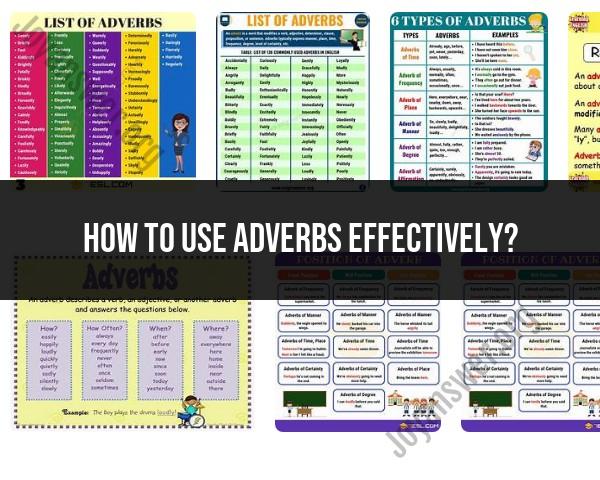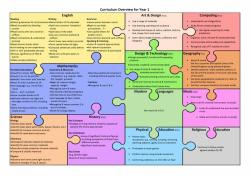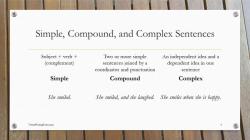How to use adverbs effectively?
Using adverbs effectively involves understanding their role in a sentence and choosing the right adverb to convey the intended meaning. Here are some tips to help you master the effective use of adverbs:
Understand the Purpose of Adverbs:Adverbs modify verbs, adjectives, or other adverbs to provide more information about how, when, where, or to what extent an action occurs. Understanding this basic function is crucial for effective usage.
Choose Strong Verbs:Whenever possible, use strong and descriptive verbs that convey the action vividly on their own. This reduces the reliance on adverbs and makes your writing more concise and impactful.
- Weak: She walked slowly.
- Strong: She sauntered.
Avoid Redundancy:Be cautious about using adverbs that repeat information already implied by the verb. Redundant adverbs can weaken your writing.
- Redundant: He shouted loudly.
- Concise: He shouted.
Place Adverbs Carefully:Consider the placement of adverbs for optimal clarity. In English, adverbs often appear before the main verb or after the verb "to be." Placing adverbs at the beginning or end of a sentence can also emphasize certain elements.
- Before the main verb: She quickly finished her homework.
- After "to be": The movie was surprisingly good.
Use Adverbs to Modify Adjectives:Adverbs can modify adjectives to provide more information about the quality of a noun.
- The extremely talented musician performed.
- She has an exceptionally beautiful voice.
Vary Adverb Placement:Experiment with placing adverbs at different points in a sentence to achieve different effects. Sometimes moving an adverb can change the emphasis or tone.
- Initially: He slowly opened the door.
- Finally: He opened the door slowly.
Be Specific:Instead of using vague adverbs, opt for specific ones that precisely convey the intended meaning. This adds depth to your writing.
- Vague: She spoke softly.
- Specific: She whispered.
Consider Adverbial Phrases:Use adverbial phrases to convey more nuanced information. These phrases often consist of prepositions and other modifiers that function as adverbs.
- Instead of "quickly," use "in a flash."
Context Matters:Consider the context of your writing and choose adverbs that fit the tone and style. The same adverb might be suitable in one context but not in another.
Revise and Edit:During the editing process, pay attention to your use of adverbs. Trim unnecessary ones, replace weak verbs with stronger ones, and ensure that each adverb contributes meaningfully to the sentence.
Remember that moderation is key. While adverbs can enhance your writing, overusing them can lead to redundancy and weaken your prose. Strive for precision and clarity, and always consider the impact of your word choices on the overall meaning of your sentences.
Techniques for utilizing adverbs effectively
Adverbs are versatile words that add detail and nuance to our language. They can modify verbs, adjectives, and other adverbs, providing additional information about how, when, where, or to what extent something happens. Effective use of adverbs can enhance the clarity and impact of your writing and speech.
Here are some techniques for utilizing adverbs effectively:
Choose the right adverb: Select the adverb that accurately conveys the intended meaning and level of emphasis. Consider the degree of intensity and the specific context of the situation.
Position wisely: Adverbs can be placed in different positions within a sentence, each affecting the emphasis and flow of the sentence. For instance, an adverb placed at the beginning of a sentence highlights its importance, while one placed closer to the verb modifies the action more directly.
Use sparingly: Overusing adverbs can make writing or speech sound clumsy and imprecise. Avoid relying too heavily on adverbs and instead focus on using strong verbs and concise phrasing.
Vary your adverbs: Employ a range of adverbs to avoid monotony and enhance the expressiveness of your language. Instead of repeatedly using the same adverbs, explore more specific or nuanced alternatives.
Use adverbs for emphasis: Adverbs can effectively highlight specific elements in a sentence, emphasizing the manner, time, place, or degree of something.
Balance adverbs with other modifiers: Adverbs should complement and enhance other modifiers in a sentence, such as adjectives and prepositional phrases. Avoid using too many modifiers, which can clutter the sentence and obscure the meaning.
Use adverbs in a natural way: Adverbs should sound natural and flow smoothly within the sentence. Avoid using adverbs that sound forced or awkward.
Proofread carefully: Carefully proofread your writing or speech to ensure that adverbs are used correctly and effectively. Check for misplaced adverbs, overuse, and inconsistencies in usage.
Remember, the key to using adverbs effectively is to use them thoughtfully and sparingly to enhance the clarity, precision, and impact of your communication.













